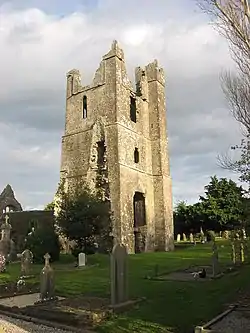St. Mary's Abbey, Duleek
St. Mary's Abbey is a medieval monastery and National Monument located in Duleek, Ireland.[1]
Mainistir Mhuire | |
 Tower, 15th century | |
 Location within Ireland | |
| Monastery information | |
|---|---|
| Order | Canons Regular (Arrouaisian) |
| Established | 1180 |
| Disestablished | 1537 |
| Mother house | Clonard Abbey |
| Dedicated to | Mary, mother of Jesus |
| Diocese | Meath |
| People | |
| Founder(s) | Hugh de Lacy, Lord of Meath |
| Architecture | |
| Status | Inactive |
| Heritage designation | |
| Official name | Duleek Church |
| Reference no. | 179 |
| Style | Norman |
| Site | |
| Location | Commons, Duleek, County Meath, Ireland |
| Coordinates | 53.655069°N 6.418806°W |
| Public access | yes |
Location
St. Mary's Abbey is located in the central part of Duleek called the Commons, between Main Street and Church Lane. The Nanny River is to the southwest.
History
A monastery stood in Duleek from the 5th century. A round tower stood here; it was damaged by lightning in 1147 but survived a few more centuries.[2]
In 1180 Hugh de Lacy, Lord of Meath granted Duleek (including St. Patrick's Church) to the Canons Regular. However, the surviving buildings are later: the southern arcade is 13th century, the southern aisle and bell tower are 15th century and the main tower and the east gable with window are 16th century. The abbey was shut down in the 1537 Dissolution of the Monasteries.
The Abbey was later used for burials. James Cusack, Catholic Bishop of Meath 1679–88, was buried in an effigial tomb. Also buried here is John Bellew, 1st Baron Bellew of Duleek who died of wounds received at the Battle of Aughrim, and his second son, Richard Bellew, 3rd Baron Bellew of Duleek. Saint Kienan's, a Church of Ireland church, was built next to the old abbey in 1816.[3][4]
Buildings
All that remains is the south aisle and the tower. The tower survives with four stories with quoins, battered walls, battlements, aumbry and stairs turret.[5] The east window (bearing the arms of Sir John Bellew and Dame Ismay Nugent beneath it) is a 1587 post-Gothic replacement.[6][7]
In the north wall of the medieval belfry is the scar or shadow of a round tower.[5]
References
- Andrew Halpin; Conor Newman (2006). Ireland: An Oxford Archaeological Guide to Sites from Earliest Times to AD 1600. Oxford University Press. pp. 288–9. ISBN 978-0-19-280671-0.
- "ME02066 - COMMONS (Duleek Lower By.) - Round tower". 6 December 2012.
- "St Mary's Abbey, Duleek, Meath".
- "Travelmania Ireland - High Cross and St Mary's Augustinian Abbey, Duleek, County Meath".
- "ME02070 - COMMONS (Duleek Lower By.) - Church - MeathHeritage.com". 6 December 2012.
- "Duleek - St Mary's Abbey and St. Cianan's Church".
- Past, Ed Hannon-Visions of the (9 February 2013). "St Mary's Abbey, Meath, Ireland".